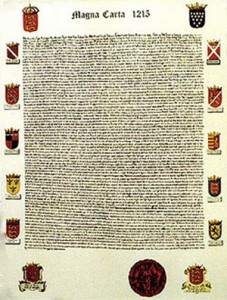
History of Legal Process Service
To see this evolution, check out this timeline:
1215 English barons extracted the principle of due process of law from King John. Clause 39 of the Magna Carta guaranteed that no free man may be taken or imprisoned, or ousted of his lands, or outlawed, or banished, or hurt in any way; nor will we [the king] go against him, nor send our officers against him, save by lawful judgment of his peers or by the law of the land. And just like that, due process was born.
1787 For more than 500 years, there was little change to due process, but on September 17, 1787, the Constitution of the United States of America was completed to be the basis as the law of the land. In this perhaps most famous document ever written, the Founding Fathers included the following language: No State shall make or enforce any law which shall abridge the privileges or immunities of citizens of the United States; nor shall any State deprive any person of life, liberty, or property, without due process of law; nor deny to any person within its jurisdiction the equal protection of the laws.
1970 The United States Supreme Court holds that the Due Process Clause protects the accused against conviction except upon proof beyond a reasonable doubt of every fact necessary to constitute the crime with which he is charged, requiring states to carry the ultimate burden of persuasion by proof beyond a reasonable doubt.
1982 A group of process servers from 11 states met in Las Vegas to form an association for the principal purpose of combating proposed federal legislation that would allow service of a summons and complaint by certified mail. That group, under the leadership of two members of the California Association of Legal Support Professionals, approved the formation of the National Association of Professional Process Servers (NAPPS). All legitimate commercial process servers should be affiliated with this group.
2001 JPL Process Service is founded, providing services to residents and businesses throughout Southern California, including the following Counties: Los Angeles, Orange, Riverside, San Bernardino, and San Diego. Today, JPL Process Service is also available in Ventura and Santa Barbara Counties.
While the ideals behind due process have changed very little over the last 800 years, the integrity of those doing the serving has. Hundreds of illegitimate process servers join the ranks every year, many of whom have given the industry a bad name.
Before choosing a process service company, do your homework. Make sure they are a member of NAPPS, that they are licensed and bonded and that they stand behind their work.
